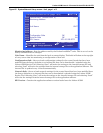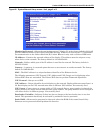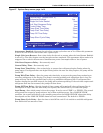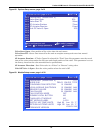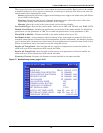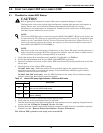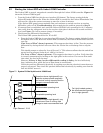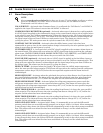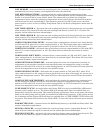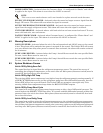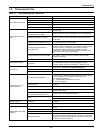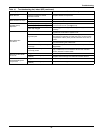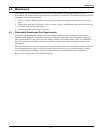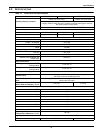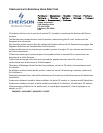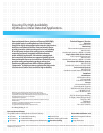
Alarm Descriptions and Solutions
67
LOW MEMORY—Activated when the control board is low in memory resources. This alarm rests
automatically as soon as memory consumption falls below the threshold.
LOW REFRIGERANT TEMP—Activated when the supply refrigerant temperature sensor
temperature reading drops below the higher of the two calculated dew points, assuming that neither
Sensor A or Sensor B has a sensor failure alarm. This alarm will reset when the refrigerant
temperature sensor reads the refrigerant temperature above both of the two calculated dew points
and the alarm has been acknowledged. This alarm can lock the unit Off. If this occurs, the main
power must be cycled, or the Low Refrig Temp Alarm Code in the Service Diagnostics menu must be
reset to 0.
LOW TEMP SENSOR A—Activated when the reading from Sensor A drops below the user-specified
alarm setpoint. The alarm will reset when the reading from Sensor A rises 2°F (1.1°C) above the
setpoint and the alarm has been acknowledged.
LOW TEMP SENSOR B—Activated when the reading from Sensor B drops below the user-specified
alarm setpoint. The alarm will reset when the reading from Sensor B rises 2°F (1.1°C) above the
setpoint and the alarm has been acknowledged.
NODEX CONDENSATION DETEC—Activated when condensation is detected on a smart module
at CAN node ID X, where X is a value ranging from 81 to 100. This alarm resets when condensate is
no longer detected. The main power must be cycled off to remove the 4°F (2.2°C) offset value.
NODEX FAN FAILURE—Activated when a fan failure occurs on a smart module at CAN node ID X,
where X is a value ranging from 81 to 100. The alarm will rest when the fan returns to normal
operation.
NODEX LOCAL SHUT DOWN—Activated when a smart module at CAN node ID X, where X is a
value ranging from 81 to 100, has been shut down by an external signal. This alarm will reset when
the remote shutdown input is deactivated.
NODEX RETURNAIR TEMPLIMT—Activated when the return air temperature (entering air
temperature to the module) exceeds the user-specified return air temperature range on a smart
module at CAN node ID X, where X is a value ranging from 81 to 100. This alarm will reset when the
return air temperature return to with the user-specified range.
NODEX SENSOR FAILURE—Activated when a smart module at CAN node ID X, where X is a
value ranging from 81 to 100, stops receiving a signal from one or more of its supply air, return air, or
refrigerant temperature sensors. This alarm will reset when signals are detected from the module’s
sensors.
NODEX SUPPLYAIR TEMPLIMT—Activated when the supply air temperature (temperature of
the air leaving the module) exceeds the user-specified supply air temperature range on a smart
module at CAN node ID X, where X is a value ranging from 81 to 100. This alarm will reset when the
return air temperature return to with the user-specified range.
PUMP SHORT CYCLE—Activated when the Liebert XDP is trying to establish flow (differential
pressure) and is unable to do so. The Liebert XDP will attempt three times to establish flow on a
pump before trying the other pump. The control will keep cycling three times on one pump, then three
times on the other pump until it is able to establish flow (differential pressure). If this cycling occurs
for 30 minutes and the Liebert XDP still does not establish flow, a PUMP SHORT CYCLE alarm will
be present. This alarm will shut down the Liebert XDP. To reset this alarm, the main power must be
cycled.
RAM/BATTERY FAIL—Activated when the RAM backup battery or the RAM itself has failed. This
requires a hardware replacement.
SENSOR A FAILURE—Activated when the controls no longer senses a signal from Sensor A. This
alarm will reset when the signal is returned and the alarms has been acknowledged.
SENSOR B FAILURE— Activated when the controls no longer senses a signal from Sensor B. This
alarm will reset when the signal is returned and the alarm has been acknowledged.



